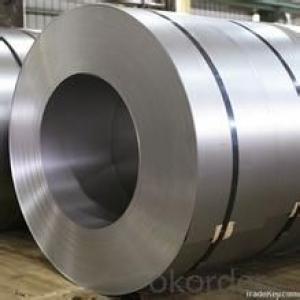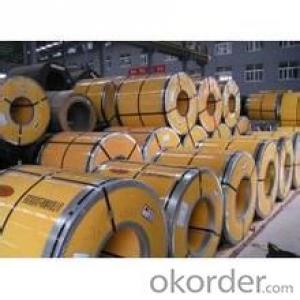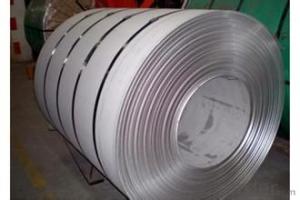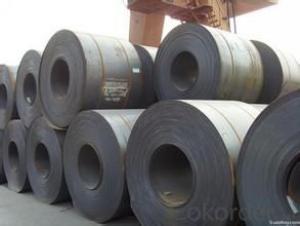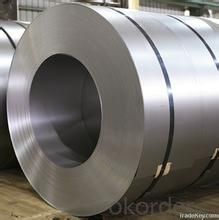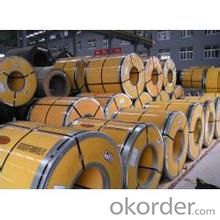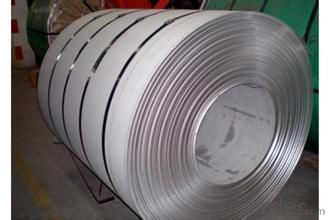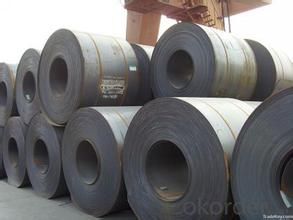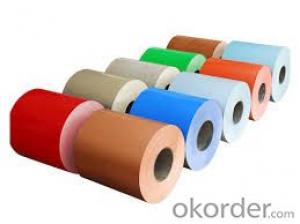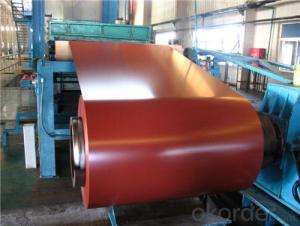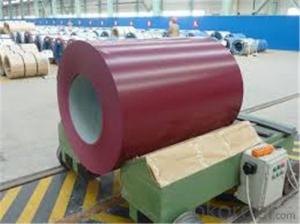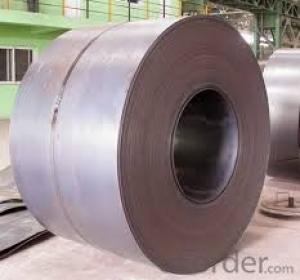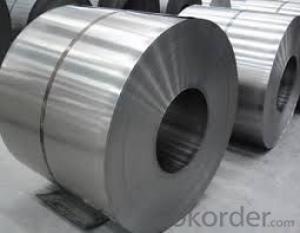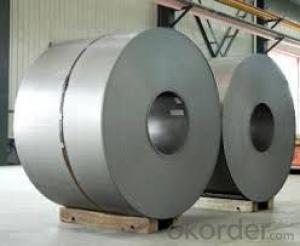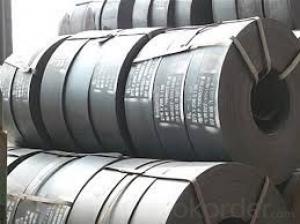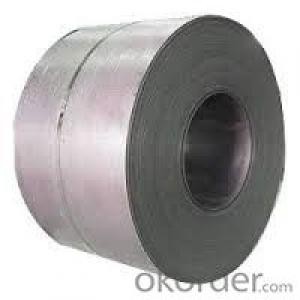Hot Rolled Steel Sheet in Coil DIN 17100 in Good Quality
- Loading Port:
- Tianjin
- Payment Terms:
- TT OR LC
- Min Order Qty:
- 20 m.t.
- Supply Capability:
- 500000 m.t./month
OKorder Service Pledge
OKorder Financial Service
You Might Also Like
Product Description:
Product: | Hot Rolled Steel Coils/Sheets |
Material: | Q195,Q235,A36,SS400,S235JR,Q345,ST37-2, CCSB etc |
Standard : | JIS G3002 GB/T251B |
Technique: | hot rolled |
Thickness | 1.2mm to 200mm |
Tolerance of thickness: | :+/-0.03mm |
Width: | 750mm-2000mm |
Tolerance of width: | :+/-5.00mm (aiming to +/-2.00mm) |
Normal width: | 914mm, 1000mm, 1200mm, 1219mm, 1250mm,1500mm |
Length: | According to requirement |
Coil ID: | 508mm-610mm |
Coil Weight: | 10-25 Metric Tons |
Surface: | Black, Chromate, fingerprint resistant treatment, slight oiled or non-oiled, dry |
Port of Loading: | Tianjin/Shanghai port |
Packaging Details: | Standard export packing or according to the clients required |
Delivery Time | Within 30 days after received 30% deposit or workable L/C |
Payment Terms: | L/C,T/T |
We can ensure that stable quality standards are maintained, strictly meeting both market requirements and customers’ expectations. Our products enjoy an excellent reputation and have been exported to Europe, South-America, the Middle-East, Southeast-Asia, Africa and Russia etc.. We sincerely hope to establish good and long-term business relationship with your esteemed company.
- Q: What is the maximum temperature that steel coils can withstand?
- The maximum temperature that steel coils can withstand typically depends on the grade of steel being used. However, in general, steel coils can withstand temperatures up to around 1,200 to 1,300 degrees Celsius (2,192 to 2,372 degrees Fahrenheit) before they start to lose their structural integrity.
- Q: What are the different types of coil edge trimming machines?
- In the market, one can find a variety of coil edge trimming machines. These machines are specifically designed for the purpose of trimming the edges of coils or rolls made from different materials like metal, paper, plastic, or fabric. Each machine type possesses unique features and capabilities to cater to specific trimming needs. 1. Manual Edge Trimmers: These machines require manual operation where an operator feeds the coil and trims the edges using a cutting tool or blade. Manual edge trimmers are suitable for trimming applications with low volumes and rely on the skill and precision of the operator. 2. Semi-automatic Edge Trimmers: These machines offer automated feeding mechanisms to assist in the coil feeding process. However, the operator still performs the trimming manually using a cutting tool. The feeding mechanism reduces manual effort and increases productivity. 3. Automatic Edge Trimmers: These fully automated machines require minimal operator intervention. Equipped with advanced sensors and controls, they ensure precise and consistent trimming of coil edges. Automatic edge trimmers can handle high volumes of coils and are often integrated into production lines for continuous trimming operations. 4. Rotary Blade Edge Trimmers: These machines utilize high-speed rotating blades to trim coil edges with precision. Commonly used for plastic or fabric coils, they provide clean and smooth cuts. 5. Guillotine Edge Trimmers: These machines employ a guillotine-like cutting mechanism to trim coil edges. The cutting blade moves vertically, resulting in straight and accurate cuts. Guillotine edge trimmers are suitable for trimming metal or paper coils. 6. Laser Edge Trimmers: These machines adopt laser technology to trim coil edges. The laser beam ensures clean and precise cuts, making them ideal for delicate or high-value materials. The choice of the appropriate coil edge trimming machine depends on the specific requirements of the application. Factors such as material type, coil dimensions, trimming precision, and production volume should be taken into consideration. Each machine type has its own advantages and limitations.
- Q: What is the role of steel coils in the manufacturing of pipes and tubes?
- Steel coils play a critical role in the manufacturing of pipes and tubes. They are the primary raw material used to produce these products. Steel coils are made by processing molten steel through a series of rolling mills, which shape the steel into flat, thin sheets. These sheets are then wound into coils for easy transportation and storage. In the manufacturing process of pipes and tubes, steel coils are unwound, and the flat sheets are passed through a series of machines and processes. The first step is usually to cut the steel sheets into the desired width and length. This is followed by forming the sheets into a cylindrical shape through a process called roll forming or continuous forming. The edges of the sheet are welded together to create a continuous pipe or tube. Steel coils provide several advantages in the manufacturing process. Firstly, they offer consistent and reliable quality. The production of coils ensures uniform thickness and strength throughout the entire length of the sheet, which translates to consistent properties in the final pipes and tubes. This is particularly important for applications that require high structural integrity and reliability. Secondly, steel coils allow for efficient production. The continuous supply of coils ensures a steady flow of raw material, reducing downtime and improving productivity. Coils also enable automated processes, such as roll forming, which can be highly efficient and cost-effective. Furthermore, steel coils offer flexibility in terms of size and dimensions. Coils can be produced in various widths and thicknesses, allowing manufacturers to customize the size and specifications of the pipes and tubes according to their specific requirements. This flexibility enables the production of pipes and tubes for a wide range of applications, from plumbing and construction to oil and gas pipelines. In conclusion, steel coils are the essential raw material in the manufacturing of pipes and tubes. They provide consistent quality, enable efficient production, and offer flexibility in size and dimensions. Without steel coils, the production of pipes and tubes would be significantly more challenging and less efficient.
- Q: What are the dimensions of steel coils used in the household appliance industry?
- The dimensions of steel coils used in the household appliance industry can vary depending on the specific application and manufacturer. However, common dimensions for steel coils in this industry range from 0.20mm to 3.0mm in thickness and 600mm to 1500mm in width.
- Q: How are steel coils processed for stamping or forming?
- Steel coils are processed for stamping or forming through a series of steps. First, the coils are uncoiled and straightened to remove any bends or twists. Then, they are fed into a stamping or forming machine, where the desired shape or pattern is formed by applying pressure. After the stamping or forming process, the excess material is trimmed or cut off, and the finished parts are inspected for quality.
- Q: How are steel coils used in the production of steel beams?
- Steel coils are an essential component in the production of steel beams. These coils are typically made by hot rolling steel strips in a continuous process. The coils are then sent to a steel beam manufacturing facility to be further processed. Firstly, the steel coils are uncoiled and flattened to obtain a flat surface. This ensures the uniformity of the beam's dimensions and improves the overall quality. The uncoiling process involves feeding the coil through a series of rollers, which gradually unroll the steel strip. Once the steel strip is uncoiled, it is then cut into specific lengths, depending on the desired size of the steel beams. This cutting process is typically done using automated machines, which ensure precision and accuracy. Next, the cut steel strips are shaped into the desired profile of the steel beams. This is achieved through a process called roll forming, where the steel strip is passed through a series of rollers that gradually bend and shape it into the required shape. The roll forming process can create various types of steel beams, such as I-beams, H-beams, and U-beams, depending on the design and structural requirements. After the roll forming process, the steel beams undergo further finishing operations, such as straightening, welding, and surface treatment. Straightening ensures that the beams are perfectly aligned and free from any deformations. Welding is performed to join different sections of the beams together, ensuring their structural integrity. Lastly, the beams are surface treated, usually through processes like shot blasting or painting, to protect them from corrosion and enhance their appearance. In summary, steel coils play a crucial role in the production of steel beams. They provide the raw material that is uncoiled, cut, shaped, and further processed to create high-quality steel beams. These beams are widely used in various construction projects, ranging from buildings and bridges to industrial structures, making them an essential component in the construction industry.
- Q: I'm just wondering what the best steel would be for an edc/hunting knife that could put up with alot of abuse.
- D2 and O2 steels are nice. They are expensive, but hold an edge extremely well. S30V is nice also. It's a more stain-resistant steel that holds an edge very well. For outdoor hiking/camping knives, it's tough to beat good old 1095 carbon steel. Sure it will rust, but it's tough as nails, not brittle, holds an edge pretty well, and easy to sharpen...and it's pretty cheap. Other steels, AUS8 is an ok cheap steel. It's stain resistant and cheap. AUS6 isn't worth the time or effort. Buck knives does an excellent job of heat treating 420 stainless to become very hard. Their knives are excellent considering 420 stainless is typically soft steel.
- Q: I was curious to what type of steel I should get if I wanted something that kept its edge longer than 154cm but is still just as stainless. I don't know much about knife steels inform me please?
- 154cm is a very good knife steel, the problem is in the heat treating. Stainless should be cryo treated to get all it can offer. That being said, if you really want to drop some coin, look at getting one made from CPM 440V. Stainless isn't as strong as carbon but on a smaller knife works well. You might also look for D-2 Tool steel. There are factory knives that are made of that.
- Q: How do steel coil manufacturers ensure product quality?
- Steel coil manufacturers ensure product quality through several methods: 1. Quality Control: They implement rigorous quality control measures at every stage of the production process, from sourcing raw materials to final inspection. This includes regular testing, sampling, and monitoring to ensure the coils meet the required specifications and standards. 2. Advanced Technology: Manufacturers utilize cutting-edge technology and modern equipment for the production of steel coils. This helps in maintaining consistency, precision, and accuracy in the manufacturing process, leading to high-quality products. 3. Skilled Workforce: Trained and skilled professionals oversee the entire manufacturing process, ensuring that each step is executed with precision. They are responsible for monitoring, analyzing, and addressing any potential quality issues, thereby upholding the product's quality standards. 4. Compliance with Standards: Steel coil manufacturers follow industry-specific quality standards and regulations. They ensure that their manufacturing processes comply with internationally recognized standards, such as ISO 9001, to guarantee the quality and reliability of their products. 5. Regular Inspections: Manufacturers conduct regular inspections and audits to assess the quality of their steel coils. This includes both in-house inspections and third-party inspections to ensure an unbiased evaluation of the product's quality. By implementing these measures, steel coil manufacturers consistently deliver high-quality products that meet customer requirements and industry standards.
- Q: i want to know what is light gauge steel and the diffrences between light gauge steel and steel for roof truss.
- guage means thickness.
Send your message to us
Hot Rolled Steel Sheet in Coil DIN 17100 in Good Quality
- Loading Port:
- Tianjin
- Payment Terms:
- TT OR LC
- Min Order Qty:
- 20 m.t.
- Supply Capability:
- 500000 m.t./month
OKorder Service Pledge
OKorder Financial Service
Similar products
Hot products
Hot Searches
Related keywords
